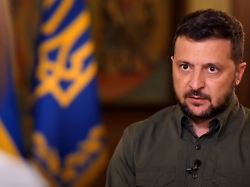In an interview, President Zelenskyy says that it would be better to advance the “demilitarization of Russia in Crimea” politically than militarily. It is clear that a sustained Russian military presence on the peninsula would pose a threat to Ukraine.
Ukrainian President Volodymyr Zelenskyy has indicated that he could envisage a negotiated settlement for Crimea once Ukrainian troops have liberated the mainland off the peninsula. “If we are on the administrative border with Crimea, I believe that it will be possible to politically advance Russia’s demilitarization on the peninsula,” he said in one interview on Ukrainian television.
Moderator Nataliya Moseychuk asked Zelenskyy in the interview why he recently said that he wasn’t sure “whether we should be talking about the military deoccupation of Crimea”. Zelenskyy replied that there would be fewer victims. “I think it would be better that way, especially for those who do [die Deokkupation] will be realised. Any war comes with casualties.”
Crimea, occupied by Russia since 2014, is not just an occupied part of Ukraine’s own territory. It also poses a military threat. According to the Russian-Ukrainian treaties, Russia was allowed to station up to 25,000 soldiers on the peninsula before the annexation. The actual number of troops prior to 2014 was between 10,000 and 12,000. But after the illegal occupation of Crimea, the number of Russian soldiers tripled and the military infrastructure was greatly modernized. Finally, in February 2022, the peninsula was used as a deployment area for the invasion of the southern Ukrainian district of Kherson.
One big base
Crimea is by far not only the main base of the Russian Black Sea Fleet, but a single large military base, with numerous airfields and ammunition depots throughout the area. Well over 200 objects on the peninsula can be used militarily – an infrastructure that is far superior to that of Russian regions on the border with Ukraine. However, Crimea has a logistical problem: It is only connected to the southern Ukrainian mainland by a few roads and only to Russia by the so-called Crimean Bridge, the prestige project of Russian President Vladimir Putin.
Both the approaches from the Crimea to the Cherson region and the 19-kilometer Crimean Bridge have been repeatedly fired upon by the Ukraine. These attacks may be a foretaste of the actual strategy that Kiev could employ in relation to Crimea: Ukraine is less concerned with a direct and likely very bloody land operation on the peninsula. Rather, Ukraine will want to take full advantage of the peninsula’s logistical weaknesses. Should the Ukrainian armed forces advance to the administrative border with Crimea in the course of their offensive actions and permanently destroy the bridges, the Russians would be almost in a blockade on the peninsula – and the Ukrainians could then also shell the ferries that run between the Russian mainland and the driving Crimea.
Critical Voices in the Ukrainian Army
According to the “Washington Post”, similar strategies were discussed in June during the visit of CIA chief William Burns to Kiev: the transfer of artillery and missile systems to the border with Crimea should, among other things, open the way to serious negotiations with Moscow. “Russia would only negotiate if it sensed a threat to Crimea,” the newspaper quoted a senior Ukrainian official as saying. Advisor to the Ukrainian presidential office, Mykhailo Podoliak, expressly denied the Washington Post report. Even then, however, Zelenskyy told the US broadcaster ABC News – without confirming the plans: “Most likely, Putin will be forced to seek dialogue with the civilized world should Ukraine reach the administrative border with Crimea.”
However, there are also voices within the Ukrainian army that negotiations with Russia would still be unnecessary. Instead, Russia should be given an ultimatum to leave the peninsula when it reaches the administrative border. If Moscow does not respond, Ukraine would begin large-scale destruction of Russian logistics, including the complete destruction of the Crimean bridge.
A few days ago, a special unit hoisted the Ukrainian flag in Crimea
It is undisputed that one of the main strategic priorities of this war for Ukraine is that no Russian soldiers are stationed in Crimea and that no new attacks on southern Ukraine can be launched from the peninsula. For Putin, Crimea is primarily symbolic, but also has a personal meaning: Its annexation in 2014 is still the greatest achievement of his presidency in the eyes of many Russians.
Ukraine has been attacking targets in Crimea for several weeks. In the past few days, a Russian S-400 air defense system has been destroyed. In addition, on August 24, the Ukrainian Independence Day, the Ukrainian military intelligence service GRU is said to have carried out an amphibious landing operation in western Crimea and hoisted the Ukrainian flag there.
